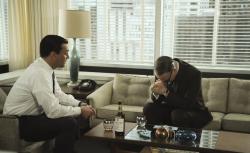Patrick, Julia,
All those intimations that a suicide was imminent this season—I’d written them off as misdirection from Mad Men’s writers. I was convinced no one was falling down the proverbial elevator shaft. Naturally, I gasped when I saw Lane plugging up the exhaust pipes of his new Jaguar, but I allowed myself a sigh of relief when that wonderfully morbid joke played out: How unreliable are those beautiful but temperamental Jags? You can’t even count on them for a decent suicide. I thought—hoped—that Lane’s brush with death would be enough to scare him into figuring out a better solution, even if it meant retreating to England, hat in hand. But it wasn’t to be. Rest in peace, Lane Pryce, the man who made SCDP possible in the first place.
Poor Lane. As if being found out by Don wasn’t bad enough, it had to happen on the day a trade group has tapped him as the new head of the irony-rich fiscal control commission—which in turn leads Mrs. Pryce to write an ill-advised check of her own. As badly as I felt for Lane himself, when we finally learned that he had indeed taken his own life, my thoughts instantly turned to his wife, who seemed so dimly aware of her husband’s predicament and who is about to find herself in a very bad one herself. It was yet another example of an observation you made earlier this season, Patrick: Even this series’ most thinly sketched characters feel fully realized, people whose lives go on even when the camera’s not following them. (It was no surprise to learn that when the camera isn’t following Glen Bishop, the older kids on the lacrosse team are urinating in his locker.)
What did you guys make of Don’s handling of Lane? When he pocketed the kited check after Cooper discovered it, I thought for a moment that he might take pity on his fellow partner. As a man who hid a deeper secret for a longer time, Don could perhaps understand what Lane had done, if not condoned it exactly, and let him off with a stern warning. But Don is unforgiving, though completely fair: Lane is the firm’s financial watchdog, and he embezzled a sizable sum. Still, I was surprised that none of Lane’s protestations—or groveling—had any effect on Don.
One theory is that his encounter at the barber shop was already having an effect on Don, unleashing the killer instinct that at least until last week’s episode had been sorely missing this season. That “big win for your little agency” line clearly stung our hero, and perhaps that explains his handling of Lane, at least in part: The Don who wants “Firestone, not Dunlop” can’t have a financial officer with his hand in the cookie jar.
But it also seemed that Don’s own experience of leading a life of deceit did play a role in how he treated Lane, just not in the way I’d assumed it would. As Don tells Lane, he’s reinvented himself again and again. The hardest moment is hitting rock bottom: But then you get up, dust yourself off, and start over, preferably with your commanding officer’s dog tags in your possession. Don assumes Lane can do as he did and just start over. But Lane is no Don—his feeling of lightheadedness isn’t relief.
We’re hoping to have the writers of this episode, Andre and Maria Jacquemetton, join us this week in the TV Club, and if they are able to make it, I hope they’ll be able to tell us what it’s like killing off a character, especially one as beloved as Lane—I imagine it must be as difficult to write as it is to watch, if not more. I’m especially curious about the composition of the scene in which Don, Roger, and Pete cut Lane down and lay his body on his couch. It was gruesome seeing his stiff and discolored corpse under the bright lights of SCDP—this wasn’t like seeing the body of a whacked wiseguy in a moonlit trunk. But the scene also gave Lane’s colleagues a chance to do something decent, to preserve some measure of dignity for Lane, for whom dignity clearly meant a great deal.
I confess I wasn’t quite sure what to make of Don’s performance at Dow: Was that Don showing us he’s still got the old fire? Or was that Don napalming the room? He showed he’s hungry, but I’m not sure I see the conservative suits in that room going for a pitch that unhinged, particularly if they already think this guy is a loose cannon after the Lucky Strike letter. I am curious to see how Lane’s death will affect Don—whether it will inspire him to redouble his efforts to make SCDP a powerhouse on Madison Avenue, or have the reverse effect, making him question the point of it all.
There’s so much more to discuss, including Sally’s very eventful day at the Museum of Natural History. I’ll leave that for you guys to hash out, but will say that I couldn’t help but be happy to see Betty have a sweet moment with her daughter (and even a chance to remind Megan that Sally still needs her real mother—a point Megan is all too happy to concede). She—and Sally pointedly kept using a pronoun to refer to her—ain’t all bad.
Don’t expect any miracles,
John
